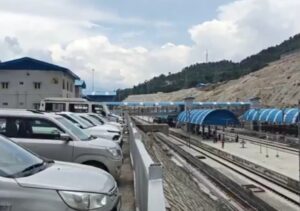Pakistan Urges Restraint Over Kashmir: Refrains from Committing to No-First-Use Nuclear Policy

Amid renewed concerns over tensions in South Asia, Pakistan’s Permanent Representative to the United Nations, Asim Iftikhar Ahmad, reiterated Islamabad’s stance as a “responsible nuclear state” while avoiding a clear commitment to a no-first-use nuclear weapons policy.
Speaking at a press briefing at the UN headquarters on Friday, Ahmad acknowledged that Kashmir is often dubbed a “nuclear flashpoint” but emphasized the need for restraint and responsibility by both Pakistan and India.
“Pakistan is a responsible nuclear weapon state. I assume that India also exhibits that same kind of responsibility, and we should not contemplate a situation that would move in that direction,” he said.
Ahmad was repeatedly questioned about Pakistan’s nuclear posture, specifically its position on first use of nuclear weapons. While he affirmed that Pakistan’s disarmament policies are “in the public realm,” he stopped short of confirming a no-first-use policy. His evasiveness reflects Pakistan’s long-standing doctrine of maintaining strategic ambiguity, keeping the option of first use open in contrast to India’s declared no-first-use stance.
Responding to questions on regional instability, including the situation on Pakistan’s western border with Afghanistan and unrest in Balochistan, Ahmad maintained that internal security operations would not impact Pakistan’s military readiness on the eastern front.
“The Western borders are under total control. There are some counterterrorism and law enforcement operations going on, but I don’t believe that impacts our preparedness along the Line of Control in Kashmir,” he stated.
On reports of aerial skirmishes, Ahmad dismissed claims of dogfights, noting only isolated drone incidents. “There were some reports about drones or ‘podcopters’ being shot down, but no aerial combat,” he clarified.
While calling for peace and dialogue, Ahmad warned that if hostilities were to escalate, “kinetic action” remained a possible scenario. His remarks underscore the fragile security landscape in the region, where longstanding disputes and internal challenges continue to fuel apprehension about future conflict.





